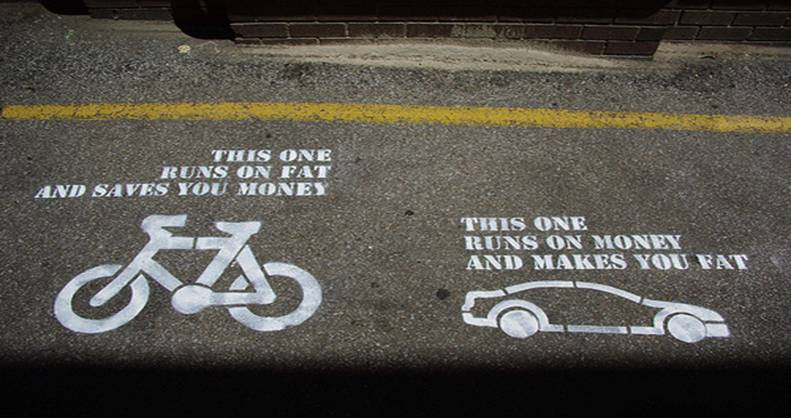Toronto politician Rob Ford is always good for a laugh, if only in recognition of how far humanity still has to go, and the clips of him in the new documentary Bikes vs. Cars don’t disappoint on this count. The former mayor is seen telling his fellow public officials that cyclists are a “pain in the ass to motorists,” and that the city shouldn’t build bike lanes because “we don’t live in Florida,” and—here’s where the laughs turn into sighs—when a bike rider gets hit by a car “it’s their own fault.” At one point he says, without irony, “The war on the cars stops today.”
From our partners:
This notion that bicycles and cars are engaged in some grand battle is at the center of Bikes vs. Cars, a film by Fredrik Gertten that begins screening in the United States this month before heading to other parts of the world. (It’s already showing in Sweden.) Avid cyclists will no doubt enjoy Gertten’s clear preference for which side should emerge victorious in this contest, but general city enthusiasts may find this either-or framework disappointing.
Gertten jumps around from place to place—Sao Paulo, Los Angeles, Toronto, Copenhagen—interviewing bike activists, planning professors, architects, car lovers, cabbies, and more. The scattershot style keeps the film lively but also prevents us from getting to know any of the characters in any real depth; instead they come off as talking heads, some better talkers than others. We need more of Gil Peñalosa saying, of city mobility, “this is not a technical issue, this is not a financial issue, it’s a political issue,” and less of the impractical scholar who fails to see the value of electric cars.
The movie does hint at the tougher discussions cities need to have about how to influence car use. At one point Dan Koeppel, a subject of the film who’s contributed to CityLab, calls on the cost of driving to match its massive social impact—a cost of lost productivity, safety, air quality, and more that’s been estimated in the trillions of dollars a year. “The only way to genuinely reduce cars is to make it more expensive to have cars,” he says. But the topic is dropped without a mention that drivers in Copenhagen and Amsterdam, two bike meccas, pay some of the highest gas taxes in the world.
Instead the heavy-handed style of Bikes vs. Cars often obscures—and occasionally even confuses—the real challenges in creating equitable transport systems. There are plenty of great arguments for car alternatives that don’t reference the mythical GM streetcar conspiracy. There are lots of benefits to bike lanes that wouldn’t do a thing for bumper-to-bumper traffic on urban interstates. There is every reason to want to eliminate bike fatalities, but generalizing drivers as irresponsible drunks, as one activist does during a street protest, doesn’t exactly claim the moral high ground over the likes of Rob Ford.
Bikes vs. Cars is at its best when it pokes at the cognitive dissonance of car reliance almost by accident. Like when an automotive marketer looks into Gertten’s camera and says, “I’m not selling my gasoline car, and I’m as green as they come.” Or when a director of car commercials tells Gertten he rides his bike to the set because traffic is so bad. Or when a cab driver in Copenhagen, that heaven for cyclists, compares his life there to “a day in hell.” It’s these moments that remind us the goal isn’t (or shouldn’t be) utter annihilation of automobiles but a shift in transport balance in urban areas, a general change in perspective.
The clearest sign of that shift does finally emerge, at the very end of the film, when we see construction workers in Sao Paulo convert parking spaces into bike lanes “without warning” one night. If there was a battle to be had all along, it wasn’t bikes versus cars, but something closer to progressive versus traditional urban street design. That’s an admittedly less attractive film title, but it comes closer to capturing the truth about how bikes and cars form complementary parts of a metro area mobility system that needs all sorts of transport options to thrive. The Sao Paulo bike activist does get it right in the end:
“You own a car, not the street. The street belongs to all of us. This is not a war. It’s a city.”
This feature is adopted from CityLab by Eric Jaffe. A review of Fredrik Gertten’s new documentary.















